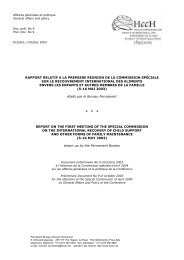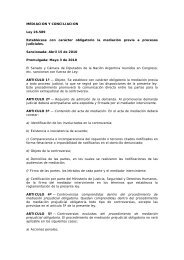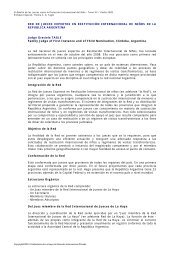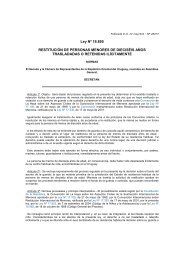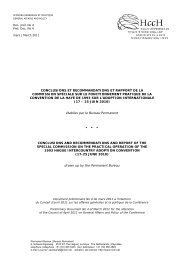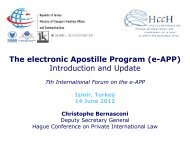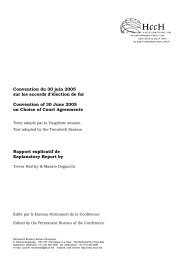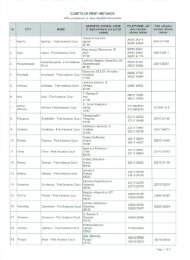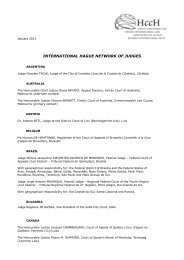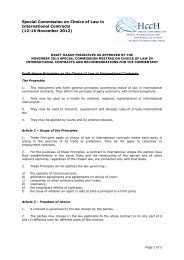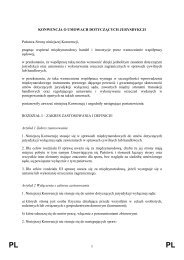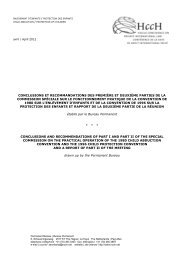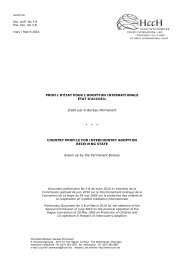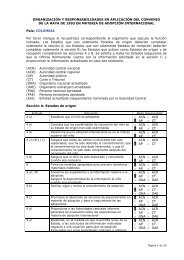aperçu des réponses au questionnaire accompagnant la ... - HCCH
aperçu des réponses au questionnaire accompagnant la ... - HCCH
aperçu des réponses au questionnaire accompagnant la ... - HCCH
You also want an ePaper? Increase the reach of your titles
YUMPU automatically turns print PDFs into web optimized ePapers that Google loves.
Question Réponse / Reply État / State<br />
9.2. Reccom. that<br />
CAs not call for<br />
trans<strong>la</strong>tion if believe that<br />
addressee understands<br />
docs?<br />
In addition, while the trans<strong>la</strong>tion requirement for formal service imposed under Article 5 may create an additional<br />
burden on the requesting party, in many States, including the United States, it provi<strong>des</strong> some degree of<br />
assurance that the recipient of the service of process is accorded full due process. Where the documents<br />
have not been trans<strong>la</strong>ted sufficiently to enable the recipient to obtain a general understanding of the nature of the<br />
proceeding, courts could find that adequate notice and an opportunity to defend themselves was not accorded the<br />
recipient of the service, and any subsequent judgment could become unenforceable. For that reason, we believe<br />
that the trans<strong>la</strong>tion requirement is fully consistent with the spirit of the convention, and the <strong>des</strong>ire to<br />
ensure that fair and equitable justice is provided all litigants. Bec<strong>au</strong>se of the liberal view of the United States<br />
with regard to informal channels of service which do not impose a trans<strong>la</strong>tion requirement, there are a plethora of<br />
alternative means that a requesting party can utilize if it wishes to avoid the trans<strong>la</strong>tion requirement.<br />
De l'avis de <strong>la</strong> Suisse, une telle déc<strong>la</strong>ration n'est pas contraire à l'esprit de <strong>la</strong> CLaH 65 dans <strong>la</strong> mesure où<br />
l'Etat qui fait une telle déc<strong>la</strong>ration procède d'abord à une notification par remise simple sans exiger de<br />
traduction. Ce<strong>la</strong> dit, nous ne sommes pas d'avis que les Autorités centrales ont le pouvoir d'obliger le <strong>des</strong>tinataire à<br />
accepter <strong>des</strong> documents dans une <strong>au</strong>tre <strong>la</strong>ngue que <strong>la</strong> ou, le cas échéant, les <strong>la</strong>ngues nationales de leur Etat. Les<br />
termes utilisés à l'article 5 alinéa 2 CLaH 65 ne peuvent pas, à notre sens, être interprétés dans ce sens.<br />
[F] Québec : En vertu de <strong>la</strong> réserve formulée par le Québec en application de l’art. 5(3), une traduction en<br />
français de tous les documents n'est exigée que lorsque <strong>la</strong> documentation à signifier ou à notifier est<br />
une procédure introductive d’instance. Cette exigence ne semble pas c<strong>au</strong>ser de problème pratique particulier.<br />
Le Nouve<strong>au</strong>-Brunswick est une province bilingue (ang<strong>la</strong>is et français). Il est utile d'avoir <strong>la</strong> traduction ang<strong>la</strong>ise de<br />
tous les documents mais si le <strong>des</strong>tinataire est francophone, il serait approprié d'avoir une traduction française <strong>des</strong><br />
actes qu'on doit lui signifier. IPE : Oui. Alberta : Ce<strong>la</strong> semblerait alourdir <strong>la</strong> démarche. Il n'y a pas de raison<br />
particulière pourquoi l'acte qui doit être signifié doit être dans <strong>la</strong> <strong>la</strong>ngue du pays où il est signifié. Toutefois, il est<br />
impératif que les instructions <strong>accompagnant</strong> l'acte en question soient dans <strong>la</strong> <strong>la</strong>ngue du pays dans lequel il est<br />
signifié.<br />
[E] Quebec: trans<strong>la</strong>tion will be required in all cases where the recipient does not understand the <strong>la</strong>nguage in which<br />
the document is written. All documents which commence actions must be trans<strong>la</strong>ted. [...] This requirement<br />
does not appear to c<strong>au</strong>se any particu<strong>la</strong>r practical problems. New Brunswick is a bilingual province (English and<br />
French). It is helpful to have English <strong>la</strong>nguage trans<strong>la</strong>tions of all documents. However, if the person to be served is<br />
French-speaking, it would be appropriate to have French <strong>la</strong>nguage trans<strong>la</strong>tions of the documents he or she is to be<br />
served with. PEI: Yes. Alberta: It would seem to make matters more cumbersome. There is no particu<strong>la</strong>r<br />
reason why the document which is being served has to be in the <strong>la</strong>nguage of the country in which it is being served.<br />
However, it is imperative that any instructions accompanying the document to be served be in the <strong>la</strong>nguage of the<br />
country in which it is being served.<br />
Il est certain que <strong>la</strong> déc<strong>la</strong>ration selon <strong>la</strong>quelle un état procédera à <strong>la</strong> signification d'un acte uniquement si celui-ci<br />
est traduit nous parait essentiel. Pour <strong>au</strong>tant, une telle déc<strong>la</strong>ration alourdirait de manière substantielle<br />
l'efficacité dans <strong>la</strong> transmission rapide du document judiciaire et surtout poserait le problème du coût de <strong>la</strong><br />
procédure <strong>au</strong> regard <strong>des</strong> frais de traduction. Néanmoins, il est indispensable, s'agissant d'un procès équitable,<br />
que <strong>la</strong> partie <strong>des</strong>tinataire du document judiciaire puisse en comprendre le contenu.<br />
Yes, it would be appropriate since unnecessary trans<strong>la</strong>tion costs are not in the interest of any party to the<br />
procedure.<br />
L’<strong>au</strong>torité centrale française est éminemment favorable à l’adoption d’une Recommandation selon <strong>la</strong>quelle une<br />
<strong>au</strong>torité centrale requise n’est pas fondée à exiger une traduction alors qu’existent <strong>des</strong> éléments <strong>au</strong>torisant à penser<br />
Suisse<br />
Canada<br />
UIHJ<br />
Fin<strong>la</strong>nde<br />
France<br />
Page 28 of 69



